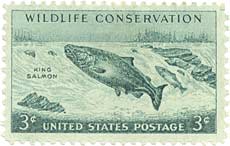The Chinook salmon or King salmon (Oncorhynchus tshawytscha) - a favorite of anglers on Lake Michigan - is in decline. That’s because it’s starving. According to a study by Michigan State University, the population of the salmon’s only prey - a small invasive fish called the alewife - has dropped by more than half since 2002. As a result, the Michigan Department of Natural Resources has been stocking fewer King salmon. King salmon is a major draw for tourists and other anglers, says Eric Conder of Big Bird Charters in St. Joseph: “Oh it’s a much bigger fish. Brute strength when they get ahold of your line, they peel that line out and you could be fighting that fish for 15, 20 minutes. Strong fish, clean fish. Powerhouse,” he says. While the salmon themselves don’t hurt the lake, you can’t have King salmon in Lake Michigan without alewives. Because of the decline in alewives, Wesley says the DNR has been forced to stock fewer King Salmon.
That makes charter captains like Link and Conder nervous. Sport fishing is a multi-billion dollar industry in Michigan. John Matson is a sport fishing guide on the Pere Marquette River - one of the rivers where the salmon spawn.
Matson says if salmon populations continue to drop, that could have a huge economic impact on the state.
“You’re talking about affecting small towns like you know our river town is Baldwin. And you’re going to take a big chunk of income away from the whole town. There’s no question,” he says.
For now, Jay Wesley says the DNR will continue to stock roughly 1.7 million King salmon in Lake Michigan. Though the DNR says it may stop stocking the fish if its numbers get too low.
As for the fishing industry, it’s probably too early to tell what effect low King salmon numbers will have on business. Fishing guide John Matson says it will be about three to four years - the average lifespan of a King salmon - before we’ll know.
“We didn’t catch them good last year. I’m still booked solid for this year. So it’ll be next year or the year after that I’ll be able to tell you for sure if these folks are still going to come up here and want to go fishing,” he says.
Source: Western Michigan University, June 24, 2016

- Login om te reageren
